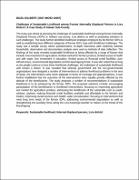| dc.description.abstract | BUZU GILBERT (2007-MO93-10087)
Challenges of Sustainable Livelihood among Former Internally Displaced Persons in Lira
District: A Case Study of Adwari Sub-County
The study was aimed at assessing the challenges of sustainable livelihood among former Internally
Displaced Persons (IDPs) in Adwari sub-county, Lira district as well as proposing solutions to
such challenges. The study further identified livelihood strategies employed by the former IDPs as
well as establishing how different categories of former IDPs cope with livelihood challenges. The
study was a sample survey where questionnaires, in-depth interviews with randomly selected
households, observation and documentary analysis were used as methods of data collection. The
findings of the study revealed sustainable livelihood as being affected by a range of factors that
include: low investment in agriculture, limited market for farmers produce, limited access to health
and safe water, low investment in education, limited access to financial credit facilities, poor
infrastructure, environmental degradation and the karamajong threat. It was also noted that as long
as the people continue to face these livelihood challenges, the realisation of sustainable livelihood
will remain a dream. It was revealed that whereas government and the non-governmental
organisations have designed a number of interventions to address livelihood problems in the area
of study, the interventions were never adequate in terms of coverage and appropriateness. It was
further established that the outcomes of the interventions were equally grossly affected by the
attitude of the beneficiaries. The study proposes a number of recommendations if sustainable
livelihood is to be achieved by the former IDPs. The proposed solutions include: encouraging
participation of the beneficiaries in livelihood interventions; focusing on improving agriculture
and market for agriculture produce; addressing the livelihoods of the vulnerable such as youth,
widows, orphans; making financial credit facilities available and affordable to the farmers and
traders; improving social services such health, water and education; focusing on interventions that
meet long term needs of the former IDPs; addressing environmental degradation as well as
strengthening the auxiliary force along the Lira-Karamoja boarder to reduce on the threat of the
Karamajong.
Keywords: Sustainable livelihood, Internal displaced persons, Lira district | en_US |


